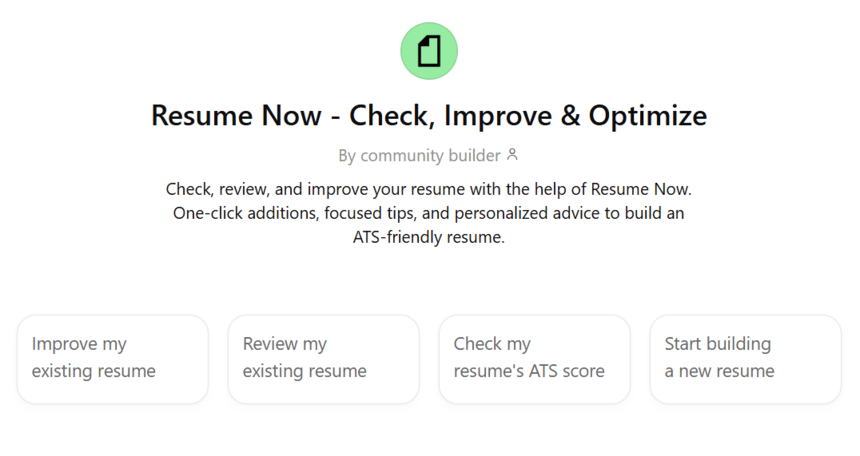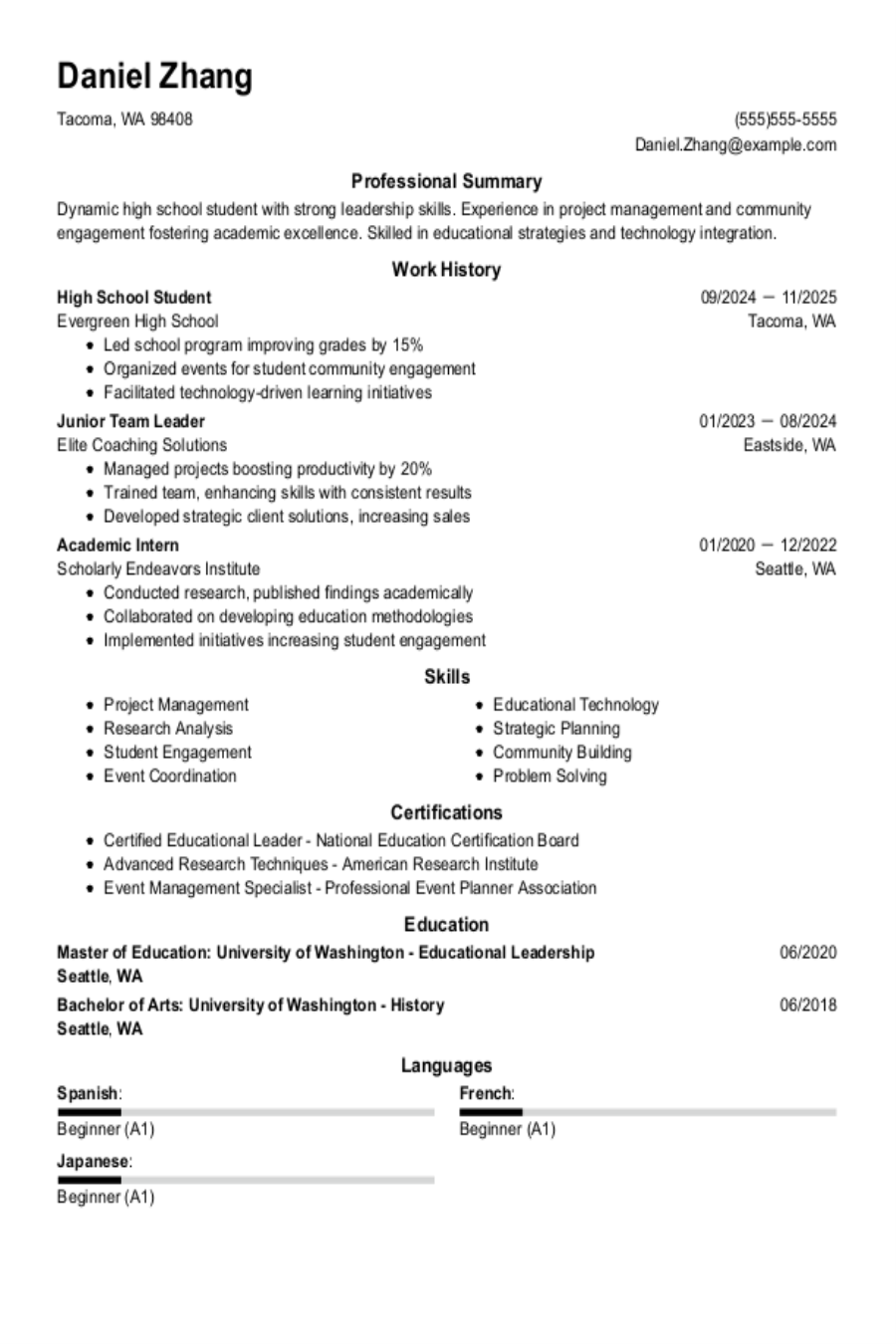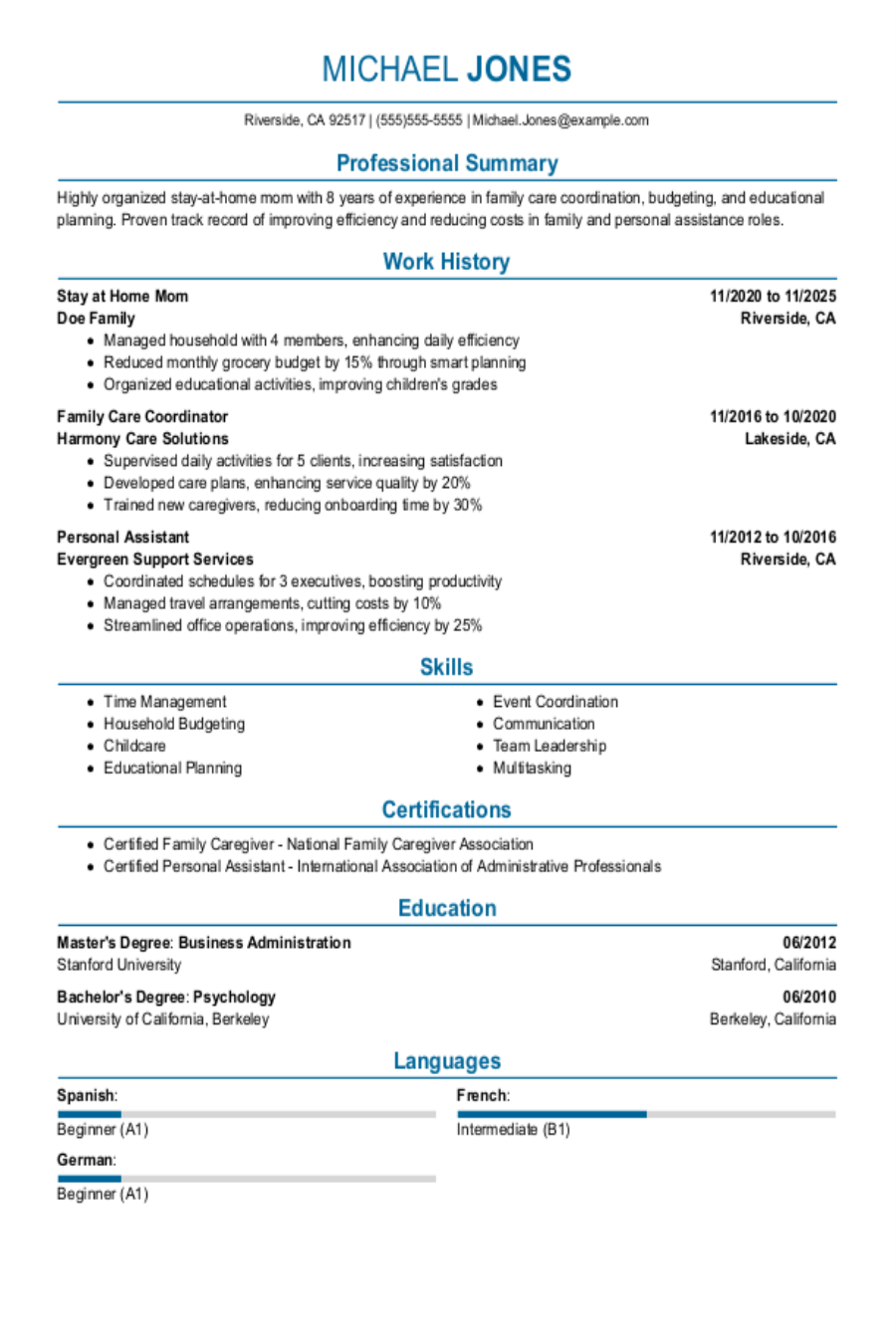Popular Business Process Analyst Resume Examples
Entry-level business process analyst resume
An entry-level resume for a business process analyst should focus on relevant educational background, internships, analytical skills, skill in data analysis tools, and strong problem-solving abilities to demonstrate potential impact.
Places skills over experience: Using a functional resume format helps this resume showcase the candidate's abilities instead of focusing on the experience that they may lack.
Emphasis on soft skills: This resume highlights the applicant's strong analytical and collaborative skills. Showcasing soft skills like problem-solving and team engagement helps show employers that this candidate is capable of achieving results in a team environment.
Mid-career business process analyst resume
A mid-career business process analyst resume should effectively highlight a combination of practical experience, analytical skills, and continuous improvement initiatives to demonstrate both expertise and professional advancement in the field.
Strong professional summary: A well-crafted resume profile highlights the job seeker's extensive experience in process improvements and project management. This clarity allows recruiters and ATS to swiftly recognize their qualifications and suitability for business process analyst roles.
Balanced skills section: This resume effectively combines technical skills in process improvement and data analysis with strong interpersonal abilities like project management and team leadership, presenting a well-rounded applicant for the business process analyst role.
Experienced business process analyst resume
An experienced business process analyst resume should prioritize showcasing measurable achievements and clear examples of how the applicant has improved processes, demonstrating their value to potential employers through a logical career progression.
Optimized for ATS: The resume uses a clean and structured template that features a professional header, ensuring it is both visually appealing and ats-friendly resume for optimal compatibility with human recruiters and automated systems.
Reverse-chronological experience: The chronological resume format highlights this job seeker's extensive experience. This helps recruiters quickly read and understand the candidate's career progression and enabling easy identification of key achievements across multiple roles in business process analysis.
No experience business process analyst resume
A resume for an applicant with no experience should highlight relevant skills, academic projects, and any internships or volunteer work that demonstrate analytical capabilities and a keen understanding of business processes.
Straightforward: Job seekers often fall into the trap of using complex jargon or lengthy descriptions to make basic tasks sound more impressive. This resume is effective because it focuses on clear and straightforward language that communicates the candidate's skills and accomplishments.
Volunteer work: Including volunteer work and extracurricular activities, especially as a candidate without professional experience, improves a resume by showcasing valuable skills like teamwork, leadership, and analytical abilities that might not be evident through professional experience alone.
More resume examples
Business Process Analyst Resume Template
Looking to showcase your skills? Use this professional business process analyst resume template as a foundation—personalize it with your own details for a standout application.
Aiko Johnson
Tampa, FL 33604
(555)555-5555
Aiko.Johnson@example.com
Professional Summary
Results-driven Business Process Analyst with 8 years of experience in optimizing workflows and enhancing operational efficiency. Proven expertise in data analysis, project management, and ERP implementation, leading to significant cost savings and productivity improvements. Skilled in driving change and delivering impactful solutions for diverse industries.
Skills
- Business Process Optimization
- Data Analysis
- Operations Management
- Workflow Automation
- Change Management
- Project Management
- ERP Implementation
- KPI Development
Work History
Business Process Analyst
Process Optimizers Inc. - Tampa, FL
February 2023 - June 2025
- Streamlined workflows, boosting efficiency by 20%
- Led a team to implement ERP system, saving 0K/year
- Reduced process redundancies by 25%
Operations Analyst
Efficiency Experts LLC - Tampa, FL
January 2018 - January 2023
- Optimized supply chain, cutting costs by 15%
- Analyzed data to improve production output by 10%
- Developed dashboards to monitor KPIs, enhancing team productivity
Business Improvement Specialist
Innovative Solutions Group - Miami, FL
January 2015 - December 2017
- Revamped sales process, increasing revenue by 0K
- Implemented CRM software, enhancing customer satisfaction by 30%
- Conducted workshops to train staff, improving workflow efficiency
Certifications
- Certified Business Process Professional (CBPP) - Association of Business Process Management Professionals International
- Six Sigma Green Belt - American Society for Quality
Education
Master of Business Administration Business Administration
Stanford University Stanford, California
June 2014
Bachelor of Science Industrial Engineering
University of California, Berkeley Berkeley, California
June 2012
Languages
- Spanish - Beginner (A1)
- French - Intermediate (B1)
- German - Beginner (A1)
Writing Your Business Process Analyst Resume
Having explored some impressive resume examples, you're now equipped to embark on the journey of crafting your own. In this guide, we’ll walk you through how to write a resume, breaking down each section to ensure you create a standout document step by step.
List your most relevant skills
Creating a compelling skills section for your business process analyst resume is important in showcasing your qualifications. Focus on highlighting both technical proficiencies, such as data analysis and process mapping, and key soft skills like critical thinking and effective communication. A balanced approach to skills emphasizes your readiness for the role and provides a comprehensive view of what you bring to the table.
To optimize your skills section, be sure to include keywords from the job listing. By incorporating terms that employers seek, you improve your chances of standing out to human recruiters while simultaneously ensuring compatibility with applicant tracking systems (ATS).
Example of skills on a business process analyst resume
- Proficient in mapping and analyzing business processes to identify inefficiencies
- Adept in using data analytics tools for informed decision-making
- Strong communicator with the ability to liaise between technical teams and stakeholders
- Collaborative team player who thrives in dynamic environments
While technical abilities are impressive, employers often prioritize interpersonal skills, as these traits are challenging to develop compared to technical skills. Highlighting them can set you apart from other job seekers and demonstrate your potential for collaboration and teamwork.
Highlight your work history
Your work experience section is an essential part of your business process analyst resume. It should highlight your achievements and demonstrate the ways you've applied analytical skills in real-world scenarios. Focus on measurable outcomes that show hiring managers the impact you've had in previous roles.
When outlining each job entry, include details such as your title, employer’s name, and employment dates. These elements give context to your experience and help build trust in your expertise within the field.
Example of a business process analyst work experience entry
- Business Process Analyst
ABC Solutions - New York, NY
June 2021 - Present - Analyze business processes to identify inefficiencies and recommend improvements, resulting in a 30% increase in operational efficiency
- Develop and implement process documentation and user guides that improve team productivity and ensure compliance with industry standards
- Facilitate workshops with stakeholders to gather requirements, translate them into actionable insights, and drive strategic initiatives across departments
- Monitor key performance indicators (KPIs) to assess the success of process changes and present findings to senior management for decision-making support
- Collaborate with cross-functional teams to align business goals with technology solutions, successfully managing multiple projects within budget and timeline constraints
Quantifying achievements as a business process analyst is essential for demonstrating the impact of your work. For example, stating you streamlined a reporting process that reduced completion time by 40% provides clear evidence of your effectiveness in improving operational efficiency.
Include your education
The education section of your resume should feature your academic qualifications in reverse-chronological order, starting with the most recent degree. Include all relevant diplomas and degrees, while omitting high school diplomas if you have completed higher education. Highlight any special honors or notable achievements to make this section stand out.
For those currently enrolled in a program or who have incomplete education, list the highest level of education achieved along with an expected graduation date. You can also include bullet points that detail relevant coursework or academic projects directly related to business analysis. This is particularly useful for recent graduates or students.
Common certifications for a business process analyst resume
- Certified Business Analysis Professional (CBAP) – International Institute of Business Analysis (IIBA)
- Certification in Business Data Analytics (CBDA) – International Institute of Business Analysis (IIBA)
- Agile Certified Practitioner (PMI-ACP) – Project Management Institute (PMI)
- Six Sigma Green Belt – American Society for Quality (ASQ)
Sum up your resume with an introduction
Your resume profile is your opportunity to make a memorable first impression, showcasing who you are as a professional. A well-articulated profile helps set the tone for the rest of your resume gives employers a quick sense of your abilities.
If you have substantial experience in business process analysis, consider using a professional summary to highlight your key achievements and skills upfront. This approach allows you to present your most relevant accomplishments clearly, helping recruiters quickly understand how your background aligns with their needs.
Alternatively, if you're an early-career candidate, a resume objective may be the right choice. This resume profile style gives you the opportunity to discuss your career progression and goals.
Professional summary example
Analytical business process analyst with over 5 years of experience in optimizing workflows and improving operational efficiency within diverse industries. Demonstrated success in implementing data-driven strategies that reduce costs and improve productivity, while fostering collaboration across teams. Proficient in process mapping, requirements gathering, and using analytical tools to drive continuous improvement initiatives.
Resume objective example
Eager business process analyst ready to apply analytical thinking and problem-solving skills to improve operational efficiency within a forward-thinking organization. Committed to using strong communication and teamwork abilities to streamline processes, improve stakeholder engagement, and drive innovative solutions that support organizational growth.
As a business process analyst, your resume profile should be succinct yet packed with critical information. Focus on distilling your expertise and key accomplishments into three sentences. You can include additional insights or experiences in the cover letter, so keep it brief.
Add unique sections to set you apart
Including optional resume sections can significantly improve your visibility as a business process analyst job seeker by showcasing your unique qualifications. These sections offer you the perfect opportunity to highlight skills and experiences that set you apart from others.
You might share relevant hobbies that demonstrate analytical thinking, or detail volunteer work that aligns with your values, such as improving community processes. Optional sections offer a glimpse into how your personal interests and commitments align with the qualities sought by the role.
Three sections perfect for a business process analyst resume
- Languages: As a business process analyst, effective communication is important for collaborating with stakeholders. Highlighting your language skills on your resume shows your ability to bridge gaps and improve understanding, making you a more valuable asset to any team.
- Volunteer Work: Including volunteer work on a resume not only highlights your skills but also shows your commitment to community service. It reveals your ability to collaborate and lead, making you stand out more to employers.
- Key Accomplishments: As a business process analyst, quantifiable accomplishments are important for illustrating your impact on organizational efficiency. If you have measurable achievements that don't fit under your experience section, include them within their own.
5 Resume Formatting Tips
- Choose a format that matches your career stage.
Selecting the appropriate resume format is essential for displaying your skills effectively. Experienced business process analysts should choose a chronological format to emphasize their career progression.
Conversely, if you're new to the field or have employment gaps, a functional resume can better highlight your skills and abilities. A combination format may prove beneficial if you wish to feature both work history and relevant skills prominently. - Pick a smart resume template.
Using a professional resume template is key to improving your document's readability. A well-designed template allows hiring managers to quickly grasp your qualifications at a glance. Choosing an ATS-friendly option ensures that your formatting stays intact when submitted through online application systems.
- Use a professional font.
When crafting your resume, opt for a clean and professional font such as Arial, Calibri, or Georgia. These widely accepted options improve readability for both applicant tracking systems (ATS) and hiring managers alike.
- Use consistent formatting.
Ensure your resume features a clean left alignment and uniform margins to improve readability and convey a polished, professional image to potential employers.
- Keep your resume to one or two pages.
When crafting your resume, aim for clarity and brevity. In most cases, resumes should be one page long to effectively highlight your skills and experience. However, if you have extensive experience, a two-page format can be acceptable. Just remember to keep it concise and relevant to the job you're pursuing.
Tools for Your Job Search
Are you gearing up to apply for that sought-after business process analyst position? Before you hit submit, take advantage of our ATS Resume Checker. This essential tool provides valuable feedback on how your resume measures up against the automated systems many companies use to screen applications initially.
Looking to polish your resume even further? Our AI Resume Builder offers tailored content recommendations specifically designed for business process analysts, along with professionally crafted templates that effectively showcase your analytical skills and experience to potential employers.
Frequently Asked Questions
Last Updated: September 8, 2025
Absolutely. A cover letter is important because it adds valuable context to your resume and creates opportunities for you to communicate directly with potential employers. It allows you to express what specifically excites you about the business process analyst role and how your unique qualifications make you a strong job seeker. So, take the time to write a cover letter that highlights your skills and enthusiasm.
For a quick and effective solution, consider using our AI Cover Letter Generator. This tool helps you create tailored cover letters in just minutes, with options for a cover letter template that perfectly matches your resume, ensuring a polished and professional presentation of your qualifications.
A resume is typically concise, spanning one to two pages, while a curriculum vitae (CV) can extend several pages and offers a more comprehensive overview of your academic background, research contributions, publications, and professional experience. This detailed format allows you to showcase your qualifications thoroughly.
You’ll often need a CV for specialized roles in academia, science, law, or medicine. If you’re unsure whether to use a CV or a resume for your application, our online CV Maker can assist you. It provides various tailored CV templates designed for different industries and career levels—helping you create an impressive document quickly and efficiently.
A frequent resume pitfall for business process analysts is submitting documents that aren’t optimized for ATS. To improve your chances of getting noticed, select a resume template is ATS-friendly and tailor your resume to reflect the specific skills and experiences highlighted in the job description. This customization will greatly improve your visibility during the application process.
To improve your networking skills as a business process analyst, regularly reconnect with former colleagues and peers. Consider joining industry-specific organizations to expand your connections. Additionally, keep your LinkedIn profile current; it’s a powerful tool for engaging with the community and discovering new opportunities in the field.
As a business process analyst, showcasing your commitment to continuous development is essential. You can do this by obtaining relevant certifications and listing completed courses or seminars. Don't forget to mention any industry-related books you've read, podcasts you listen to regularly, and memberships in professional associations. These elements serve as tangible proof of your dedication to staying informed about the latest trends and advancements in your field.
Was this information helpful? Let us know!
Hailey is a career advice writer dedicated to helping job seekers excel in their careers.
More resources

Resume Now's Custom GPT for Resume Writing
Improve your resume with tailored advice and tips using Resume...

The Quiet Cry at Work: 4 in 10 Employees Have Cried on the Job
Resume Now report finds that 4 in 10 employees have cried at w...

Student Resume: Examples & Templates
As a student you need a resume that captures the attention of...

Stay At Home Mom Resume: Examples & Templates
As a stay-at-home mom building a resume that highlights your ...



